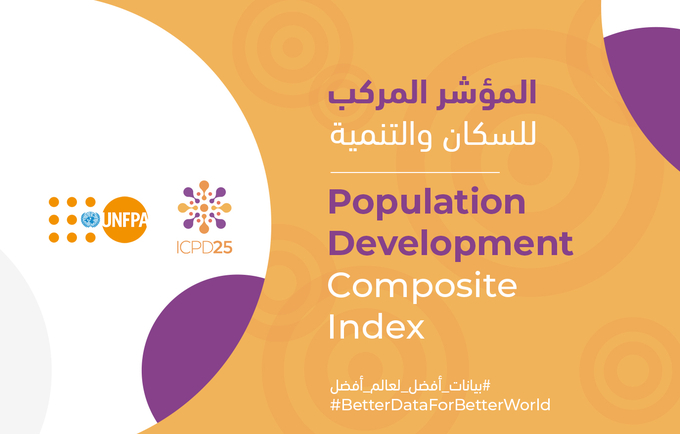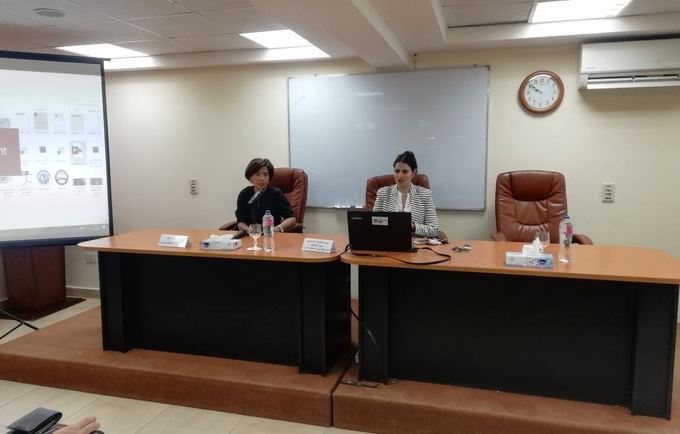The United Nation Population Fund and the League of Arab States launched the Population and Development Composite Index
Admin (Egypt)
 2021-10-10
Link
2021-10-10
Link
Cairo, Egypt, 11 July - The UNFPA Arab States Regional Office and the League of Arab States launched today the Population Development Composite Index (PDCI).
The Population Development Composite Index is a visionary tool that promotes a people-centered sustainable development agenda in the Arab region and allows tracking achievements towards the International Conference on Population and Development (ICPD), and related Sustainable Development Goals from a population development lens.
To ensure full and effective implementation of the ICPD agenda and achieve the Sustainable Development Goals and the 2030 vision in the Arab states, UNFPA ASRO took the lead to develop the PDCI to help track and measure population progress in development among Arab countries using the indicators of the 2030 Agenda.
The UNFPA Arab States Regional Director, Dr. Luay Shabaneh noted: “UNFPA supported advocacy initiatives to adopt the Population Development Composite Index with regional partners, including the Arab Institute for Training and Research in Statistic, ESCWA, the Arab Population Councils, and the League of Arab States. UNFPA also works with national statistics offices to develop their capacity for the use of this tool. We call on all countries to use this Index to help them monitor and evaluate their progress towards achieving the Sustainable Development Goals at the national level by adopting evidence-based people-centered policy directions. And we are ready to help them develop their national PDCI reports.”
Her Excellency Ambassador Dr. Haifa Abu Ghazaleh, Assistant Secretary-General, Head of Social Affairs sector at the League of Arab States, expressed her appreciation for the continuous efforts of the United Nations Population Fund as a supporter and main partner of the Arab Council for Population and Development, and for the great importance of today’s initiative of launching the Population and Development Composite Index (PDCI), which reminds us of the importance of addressing the data gap and its role in strengthening the national response during disasters and crises. She also emphasized the important role of national statistical agencies in providing data, as well as the importance of the indicators in developing measurable strategies and reviewing them periodically.
His Excellency the Minister of Public Health of Tunisia, Dr. Faouzi Mahdi, pointed out in his speech the importance of data on population in terms of size, growth, demographic characteristics, living conditions, governance, accountability, and sustainability, in order to formulate policies and planning.
Dr. Mahdi considered the harmonization between policies and other interventions within the comprehensive framework of the 2030 Agenda as the only way for the region and the world to implement this goal. There is no doubt that data is the backbone of any meaningful decision, and it is necessary to adopt new indicators and put them in an integrated framework to see the full picture. The Population and Development Composite Index (PDCI), an important step for evaluating the region's performance on the path to achieving the 2030 Agenda and see where it stands in terms of the Sustainable Development Goals.
The PDCI is founded on the principle that individuals are the centre of the implementation of the Sustainable Development Goals and that any progress towards their achievement must be evidenced by a positive change in the lives of people, while ensuring that ‘no one is left behind’.
The PDCI tool is based on the five themes (pillars) stipulated in the United Nations General Assembly resolution 65/234 on the review of the implementation of the Programme of Action of the ICPD, namely; dignity and human rights, health, place, and mobility, governance and accountability, and sustainability.
The Population Development Composite Index (PDCI) will help Government bodies, parliamentarians, NGOs, and regional entities working in the population and development field at the national level to benchmark, monitor, and evaluate the progress of the Sustainable Development Goals from a population lens and to reach evidence-based policy directions.
The performance of the Arab world on PDCI is estimated at a medium level with large disparities between countries in terms of implementing the population and development agenda. More efforts are required to accelerate progress and achieve the population and development agenda. The Index will thus contribute markedly to the countries’ inclusion policies and to the achievement of the Sustainable Development 2030 Agenda principle of leaving no one behind.
###
Launch hashtags: #LeaveNoOneBehind! #BetterDataForBetterWorld
Link to the video of the PDCI launch event: https://youtu.be/bVz7k7PYzY0
Link to the PDCI 2020 report: https://rb.gy/uevefa
UNFPA delivers a world where every pregnancy is wanted, every childbirth is safe, and every young person's potential is fulfilled.
For more information, please contact:
Rose Marie Gad, Communications Analyst, the United Nations Population Fund for the Arab States Region, gad@unfpa.org, +201021767215



